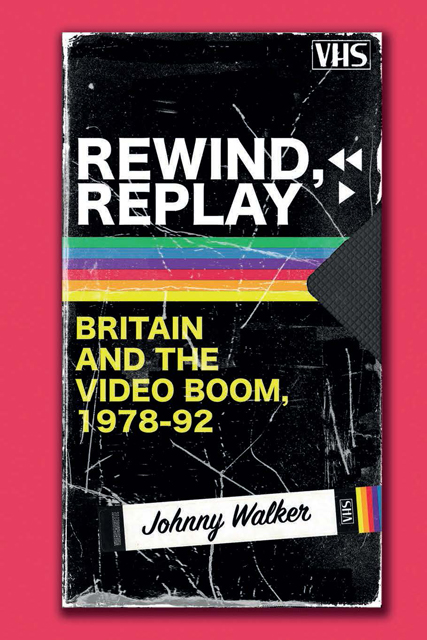Book contents
- Frontmatter
- Contents
- List of Figures
- Acknowledgements
- Introduction: Rewind, Replay
- 1 We’ve Got It Taped
- 2 Shrugging Off the Recession
- 3 Threats and Benefits
- 4 Regulation and Adaptation
- 5 Independent Spirit vs Corporate Muscle
- Conclusion: Video Legacies
- Select Bibliography
- Select Film/TV/Videography
- Select Periodicals
- Index
Introduction: Rewind, Replay
Published online by Cambridge University Press: 18 November 2022
- Frontmatter
- Contents
- List of Figures
- Acknowledgements
- Introduction: Rewind, Replay
- 1 We’ve Got It Taped
- 2 Shrugging Off the Recession
- 3 Threats and Benefits
- 4 Regulation and Adaptation
- 5 Independent Spirit vs Corporate Muscle
- Conclusion: Video Legacies
- Select Bibliography
- Select Film/TV/Videography
- Select Periodicals
- Index
Summary
. . .the history of video in Great Britain … would be a book unto itself.
Joshua M. Greenberg, From Betamax to BlockbusterThose too young to know otherwise would be forgiven for assuming that the pastime of video rental, whereby individuals went to their local video shop to rent a pre-recorded videocassette for the evening, was, like hamburgers and southern fried chicken, a US phenomenon. Until its filing for bankruptcy in 2010, the Blockbuster Video brand, owned by US conglomerate Viacom since 1994, was ‘the dominant player in the [video] rental business’ and the mainstream public face of video store culture throughout the globe. Established in Dallas, Texas, in 1985, within three years it was North America's leading rental chain and, in the decade that followed, penetrated markets all over the world. Today, when screen entertainment is accessed largely via various streaming platforms, and when at the time of writing there is only one remain¬ing Blockbuster store in operation (in Bend, Oregon, USA), Blockbuster's ‘yellow and blue’ branding remains, for many, ‘iconic’: a nostalgic signifier of a bygone era.
In March 2021, in a somewhat ironic turn of events, the streaming service that usurped Blockbuster's empire in the mid-2000s, Netflix, released The Last Blockbuster(Taylor Morden, 2020), a documentary exploring Bend's quirky anachronism. The film is, in part, a human drama: an introspective look at how a group of passionate individuals, led by committed store manager Sandi Harding (affectionately nicknamed ‘Blockbuster Mom’), have shaped the Blockbuster store into a community space once again: a heritage site, which could, at any minute, close for good. But the film is also, to quote the Sundance Institute, an ‘entertaining tribute’ to the video shop era, and a film that happens to be another in a long list of documentaries and narrative features of the past few years that, in various ways, celebrate pop cultural touchstones of the 1980s and 1990s, of which video rental was one, and which Blockbuster, as The Last Blockbuster shows, continues to emblematise.
From its beginnings up to its demise, Blockbuster Inc., like the McDonald's fast-food chain, denoted capitalism of an ‘American’ style. Its global expansion was rapid, aggressive, uncompromising. Prior to the digital age when Blockbuster's fortunes started to wane, it was operating around 9,000 stores across the world in territories as vast as the US, Europe, Asia and Australia.
- Type
- Chapter
- Information
- Rewind, ReplayBritain and the Video Boom, 1978-1992, pp. 1 - 16Publisher: Edinburgh University PressPrint publication year: 2022



